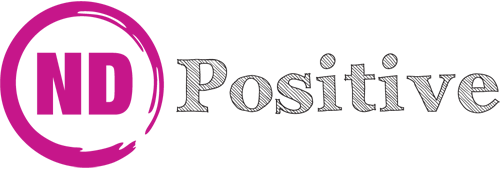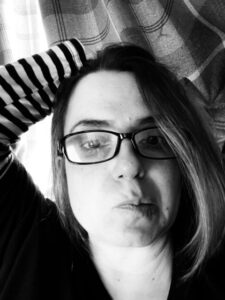ND Type/s: Tourette’s syndrome
What do you do: I’m a full-time PhD student
Where do you live: Melbourne, Australia
How did you start your day, do you have a morning routine, and what do you have for breakfast, do think a good diet is important?
I usually start my day by getting my son ready for school, answering any work emails, and working on any current projects. So I’m very busy in the mornings, but I try to eat a healthy diet because that’s so important in keeping your energy levels up, and is so beneficial for your health and wellbeing.
How do you stay active?
Having such a heavy work schedule I find it difficult to find the time to stay physically active as it’s mostly mental work that I’m doing. But I love walking my dog by the stream near my house.
What do you do to relax?
I’m not sure if it’s related to being neurodiverse but I’m an avid gamer! I love massive multiplayer online role playing games (MMORPGs), and I have a group that I play with in the United States every Sunday. I find that I’m able to completely zone out whilst I’m playing. My tics relax and I get completely absorbed in the fantasy world that I’m playing in. Games are a massive way for me to wind down and have been instrumental in successfully regulating my stress levels, countless times.
Do you have a favourite word or phrase?
Do your best, be kind to yourself, do what you enjoy, but also challenge yourself because that’s how we grow.
Have you read anything good recently? Is there a book that changed your life?
I mostly read psychology books, and I’d love to have more time to read non-fiction true crime – a massive interest of mine. But a book that has stuck with me all my life – as cliche as it may be – is Harry Potter. This series of books resonated with me at a young age in a very deep way. I think what has been so influential about them was Harry’s ability to be resilient, kind-hearted, strong, and brave despite not having a strong support system and an immensely adverse childhood experience. This is something that inspires me to do my PhD in psychology – to explore the nature of adversity in those who may be more disadvantaged socially, but still show such resilience, strength, and courage.
Which 5 albums will you want to have with you on a desert island?
I like a bit of everything when it comes to music, but as I’d be on a desert island, I think I’d like some reggae, electronic dance music, and the Big Lebowski soundtrack!
What is the best piece of advice you’ve ever received and who was it from?
The best piece of advice I ever received was from my 10 year old son. He told me that it’s okay to be myself, and if that’s different that’s okay too. He was the one who encouraged me to be open with my Tourette’s and not be ashamed of who I am. Just thinking about it now makes me emotional, I’m so proud to be his mum.
When you were younger, what did you want to be when you were a grown-up? And what was your first Job?
Haha, when I was younger, I honestly just wanted to be a wizard – probably due to Harry Potter… but when I realised I wasn’t getting my letter to Hogwarts, I decided to work in hospitality. My first proper job was as a bartender in a nightclub in Scotland, which I absolutely loved! I was a bartender over there for a few years, and worked in clubs in Australia for a few more before deciding to become serious about studying and pursuing my passion for psychology.
What do you do now and how did you get into it?
Right now I’m a full time PhD student in Melbourne! I got into it because I’ve always been fascinated by people, but have never really felt as though I fit in. Now that I’m older, I realise this may be due to my neurodiversity. But having this experience has really made me passionate about psychology in general, because I want to try and understand the nature of the human experience. This is what led me to study autism research – because it’s such a fascinating and unique spectrum of conditions. The aim of my PhD is to explore critically important issues for the autistic community (particularly in relation to the understudied area of gender), by implementing inclusive research practices and being guided by feedback from the autistic community. I’m hoping that my research will inform the direction of future research and the implementation of prevention and support strategies/services for autistic individuals of varying gender identities and sexual orientations who may be at risk/have a history of being a victim of varying forms of interpersonal violence.
Creativity and thinking differently are often credited to neurodiversity. Would you say that is true? And if yes, could you give an example?
I absolutely agree with this. I find that my neurodiversity provides me with a unique perspective when examining the social world, and I find the nature of human interaction fascinating – both good and bad. This intense fascination and my ability to hyper-focus enable me to spend endless hours learning about and pursuing these interests.
When you feel overwhelmed or unfocused, or have lost your focus, what do you do to get back on track? Do you have any hacks, tips or do you use any apps to keep you on track during the day?
This is an important point to mention because I think that getting overwhelmed and being unfocused are two of the key barriers to achieving what you set out to achieve. Personally, I struggle with this myself, but I find that having soothing music playing while I work helps, and getting work done in the morning when you’re the most focused is also very important (or whatever period of the day this might be for you). If I get too overwhelmed, I find gaming to be an “off-switch” that enables me to escape to another world, allowing time for my emotions/stress-levels to self-regulate.
What makes you happy?
What makes me happy is seeing people be kind, brave, courageous, and strong, despite the adversity they may face. I think the strength and kindness in the human spirit is the number one thing that makes me feel a sense of deep happiness and connection to others.
What has been your biggest achievement so far?
My biggest achievement, aside from having a beautiful son who I’m so proud of, is doing a PhD in an area I’m so passionate about. I think the possibility of being able to help neurodiverse individuals who experience adversity means the absolute world to me, and I’m humbled by the experience.
Do you have a Positive ND message to the world? Imagine you have a £5 million advertising campaign to spend on billboards all over the world > What would you say?
As my son once told me, never be afraid to be who you are.
Final question – where can people find out more about you. Do you have a website and social media pages.
My social media handle is ticsntatts – I’m on
Feel free to follow me if you want to see videos about my experience living with Tourette’s syndrome as an adult.



